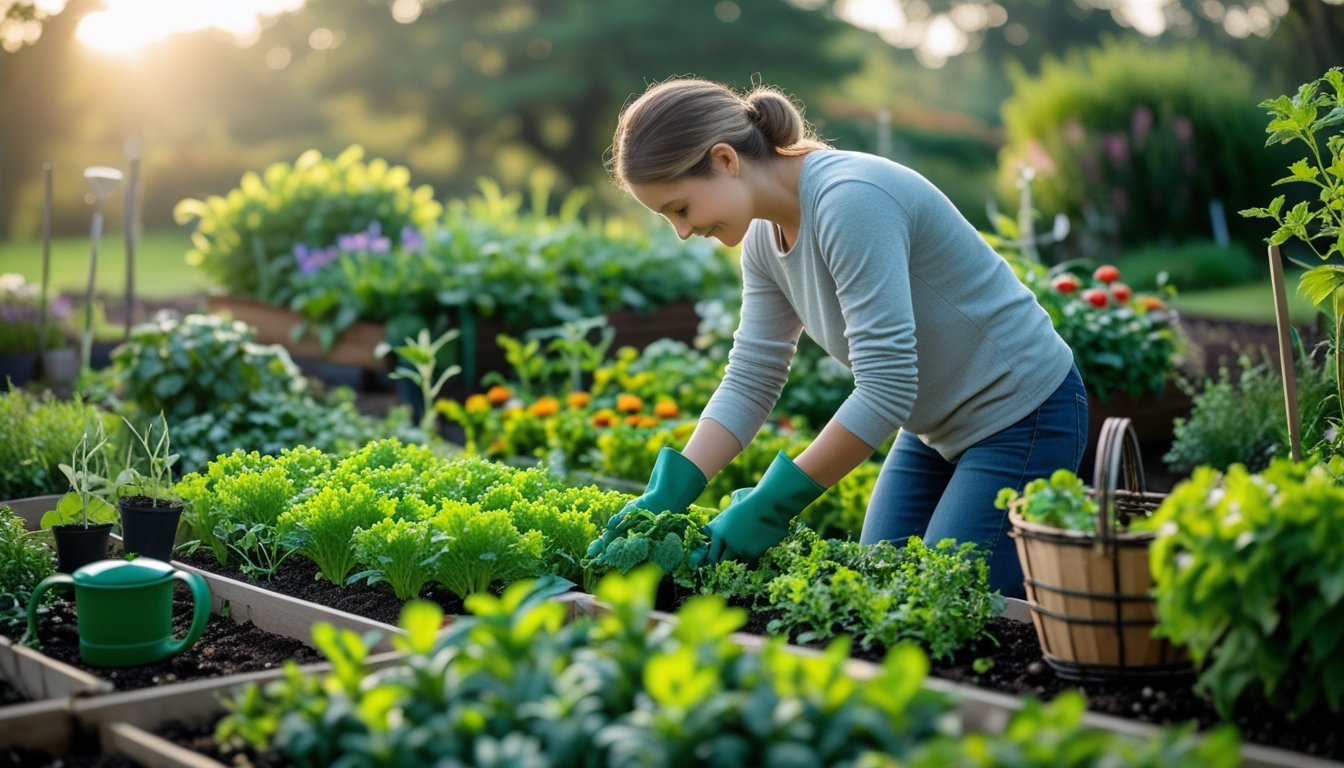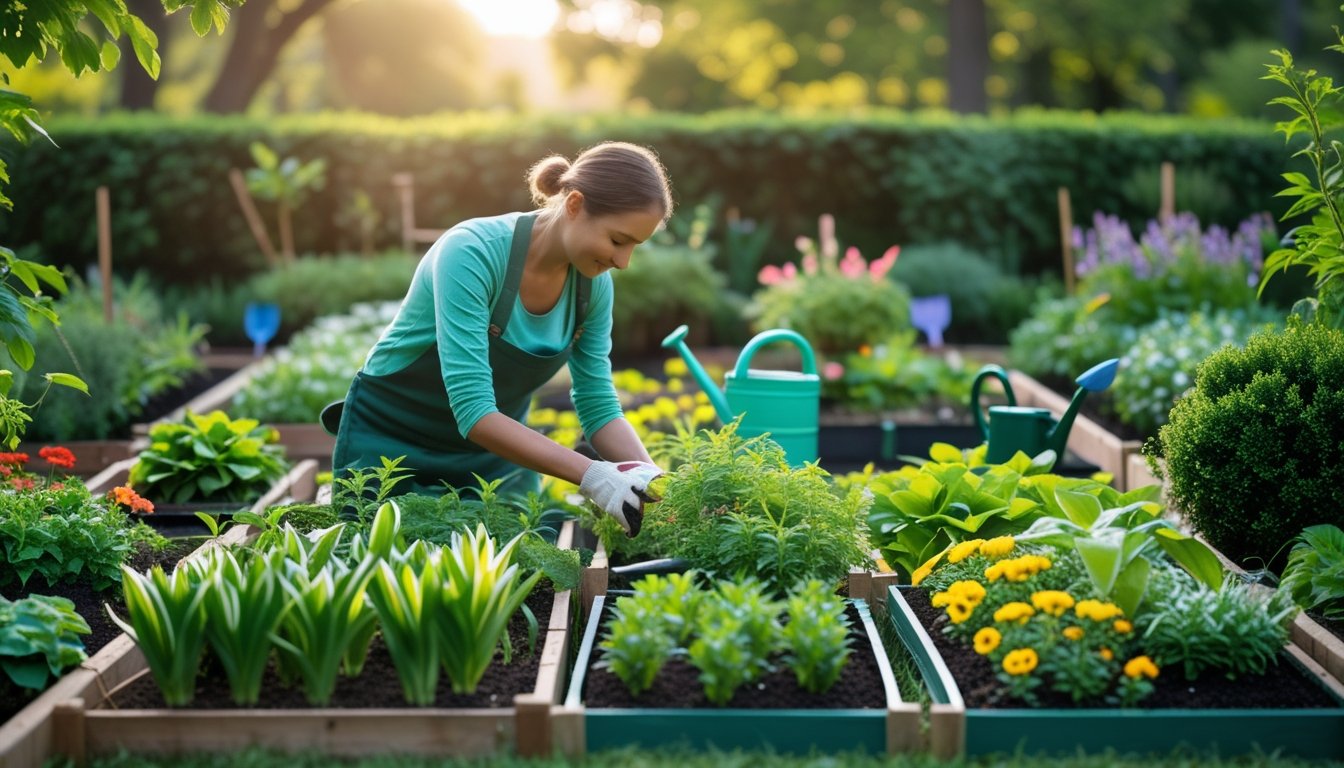Late updated: 27 Nov 2025 09:11
Written by: Ella Thompson
Mindful Gardening Techniques For Wellbeing Enhancement: Tips For A Healthier Lifestyle
Gardening offers more than just visual beauty and fresh produce—it holds the potential to enhance our mental well-being significantly. In today's fast-paced world, integrating mindfulness into gardening can turn a routine activity into a deeply rewarding experience. Mindful gardening allows us to connect with nature, reduce stress, and cultivate a sense of peace and presence in our daily lives.

Whether dealing with a sprawling garden or nurturing a small plant on a windowsill, the practice involves being present at the moment—as we tend to the soil, breathe in the fresh air, and observe the growth of plants. This focus on mindfulness helps us restore balance and find joy and purpose amidst our hectic schedules.
By learning and applying mindful gardening techniques, we can create a sanctuary of tranquillity in our gardens and within ourselves. These practices not only improve our mental health but also foster an enduring connection with the natural world around us.
Key Takeaways
- Mindful gardening enhances mental well-being and reduces stress.
- It encourages a deeper connection with nature and ourselves.
- Practical techniques bring tranquillity and joy to everyday life.
Core Principles and Benefits of Mindful Gardening
Mindful gardening has become a popular practice, uniting the physical activity of tending gardens with the mental clarity offered by mindfulness techniques. The essence of this practice focuses on being present, carrying out tasks with a purpose, and embracing the patience required for growth. It provides a multitude of mental and physical health benefits, including stress reduction and a deeper connection with nature.
Understanding Mindfulness in the Garden
Mindfulness in gardening involves cultivating an awareness of the present moment while interacting with nature. By focusing on the sights, sounds, and textures of the garden, we can immerse ourselves fully in the task at hand. This presence allows us to consciously engage with the environment, overall calming the mind and freeing us from distractions. As we adapt to this practice, we notice the transformative effect it has on our mood, bringing an enhanced sense of inner peace and gratitude. Mindfulness teaches us to appreciate the simple pleasures of nature, helping reduce stress and promote a focused and centred state of being.
Key Principles: Presence, Intention, and Patience
Central to mindful gardening are the principles of presence, intention, and patience. Presence involves being fully aware of the gardening experience, engaging with each task as it unfolds. Intention refers to the conscious setting of goals in our gardening activities, ensuring that we are purposeful with each seed sown and plant nurtured. Patience is an essential virtue in gardening, reminding us to respect the natural pace of growth and change. Together, these principles foster a deeper connection to our surroundings and ourselves, enabling us to grow in tandem with our gardens and appreciate the slow cultivation of beauty and life.
Emotional and Mental Health Benefits
The emotional impact of mindful gardening is profound. As we immerse ourselves in gardening, we find it becomes a valuable tool for stress reduction, soothing the mind by providing an outlet for excess energy and anxiety. This practice can significantly improve our mood, enhance focus, and promote mental clarity. By connecting with nature, we foster a sense of peace and acceptance of life's natural cycles. Gardening encourages reflection and may cultivate emotional resilience, helping us cope with challenges more effectively. Such benefits contribute to our overall mental health and wellbeing, offering a fulfilling and therapeutic experience.
Physical Health and Connection with Nature
Mindful gardening is not only mentally enriching but also offers notable physical health advantages. Engaging in gardening tasks is a form of gentle exercise that can improve fitness and flexibility. The repetitive actions of planting, weeding, and watering require various physical movements beneficial to maintaining an active lifestyle. This connection with nature also facilitates a deeper appreciation of the environment. It allows us to witness the interdependence of life firsthand, fostering a holistic connection between our well-being and the ecosystems around us. Ultimately, this practice nourishes both body and mind, grounding us in the natural world and invigorating our sense of vitality.
Practical Mindful Gardening Techniques for Wellbeing

Integrating mindfulness into our gardening routines can transform the act from a mere chore into a meditative and rewarding practice. By focusing on sensory engagement, breathing techniques, creating consistent habits, and fostering gratitude, we can enhance our connection to the garden and improve our mental and physical wellbeing.
Sensory Awareness and Engagement
By paying close attention to the sensory elements in our garden, we deepen our experience of the natural world. Engaging our senses allows us to appreciate the subtle textures of leaves, the vibrant colours of flowers, and the myriad scents of herbs and soil. We can start by deliberately touching different plants, noting each texture. This tactile exploration heightens our sensory awareness. Listening to wind rustling through the trees or the distant hum of bees offers a grounding experience. Smell plays a crucial role too: we can inhale deeply the fragrances of herbs like lavender or rosemary, calming our minds and enhancing our sense of presence in the garden. Such attentiveness not only enriches the gardening experience but also improves our mental clarity and reduces stress.
Mindful Breathing and Movement
Incorporating mindful breathing into our gardening practice can transform physical activity into a meditative exercise. As we prune or plant, aligning our breath with our actions fosters a sense of rhythm and flow. We might inhale deeply while gathering our tools, and exhale slowly as we press seeds into the earth. This breath-focused approach can slow our movements, promoting calm and reducing stress. Gardening often requires bending and stretching, akin to gentle yoga. We can use these moments to practice mindful movement by noticing sensations in our muscles and joints. This union of breath and movement not only enhances focus but also leaves us feeling rejuvenated and centred.
Routine Creation and Journaling
Establishing a regular gardening routine can provide structure and predictability, which in turn nurtures both our garden and mental wellbeing. Setting aside specific times to tend to the garden helps us build consistency, turning gardening into a cherished habit. Using a gardening journal to document our activities, such as planting, pruning, and harvesting, allows us to track progress and observe nature's cycles. This record-keeping can become a mindful practice itself, providing a moment to reflect on our interactions with the garden. Our journal entries may include observations on plant growth or personal reflections, adding depth to our gardening experience. In this way, routine and journaling work together to enhance awareness and appreciation.
Gratitude Practice in the Garden
Practicing gratitude while gardening can profoundly impact our emotional wellbeing. Taking a moment to appreciate the garden's gifts fosters a sense of abundance and contentment. We can begin by acknowledging the simple pleasures that our garden offers: the first bloom of spring, the taste of freshly picked herbs, or the health benefits of physical activity. Expressing gratitude for these moments, either silently or within our gardening journal, nurtures a positive mindset. This conscious act of gratitude encourages us to focus on the present and recognise the achievements of our labour. Ultimately, cultivating gratitude in the garden fosters a deep sense of connection to the environment and enhances our overall happiness.
Frequently Asked Questions

In exploring mindful gardening, we examine how the practices involved not only enrich our connection with nature but also enhance our psychological wellbeing. This discussion delves into how sensory gardens, rhythmic activities, and stress reduction techniques play vital roles.
What are the core principles of integrating mindfulness into gardening?
Mindful gardening entails approaching each task with focused attention and awareness. We prioritise observing the present moment, utilising all our senses to fully engage with the process of planting, tending, and nurturing our gardens. We strive to cultivate a non-judgmental presence, observing nature and encouraging a deeper connection with our surroundings.
How does gardening contribute to mental health and wellbeing?
Gardening provides a therapeutic outlet, helping us manage stress and anxiety. By engaging with nature regularly, we benefit from mood enhancement and a natural increase in serotonin. The combination of physical activity and the inherent tranquillity of a garden setting supports emotional healing and resilience.
What practices can one adopt to enhance mindfulness while gardening?
To enhance mindfulness, we can incorporate quiet reflection and intentional breathing as we work with the soil. Pausing to appreciate the colours, textures, and scents offers a simple yet effective way to anchor in the present moment. Setting time aside for regular, mindful gardening activities encourages mental presence and relaxation.
Could you explain how sensory gardens promote psychological wellness?
Sensory gardens are designed to awaken our senses through thoughtfully arranged plants and features. By stimulating touch, sight, sound, and smell, these gardens help us reconnect with nature and our bodies. It's an interactive experience that not only promotes relaxation but also fosters mindfulness and a sense of peace.
In what ways does mindful gardening impact stress reduction?
Mindful gardening is effective in reducing stress by encouraging us to slow down and focus on the now. This shift in attention from daily concerns to the calming act of nurturing plants helps in alleviating stress and anxiety. Cultivating this presence eases mental clutter and enhances overall emotional stability.
What is the role of rhythmic gardening activities in cultivating mindfulness?
Rhythmic activities, such as repetitive planting or weeding, act like a meditation, allowing us to find rhythm and calm. These tasks provide a structured environment where we can practice singular focus and detach from racing thoughts. This routine supports mindfulness, helping to quiet the mind and promote a serene mental state.
